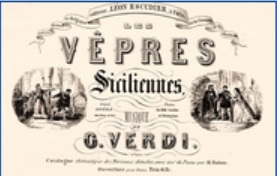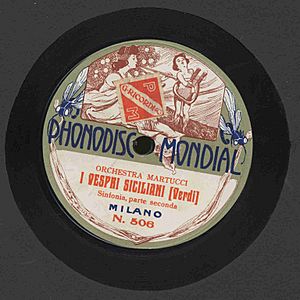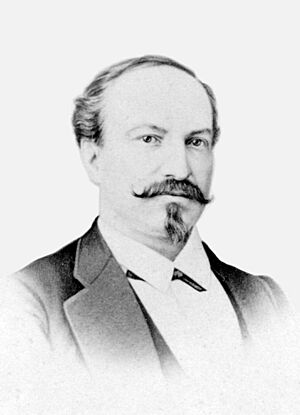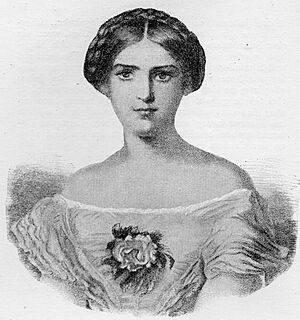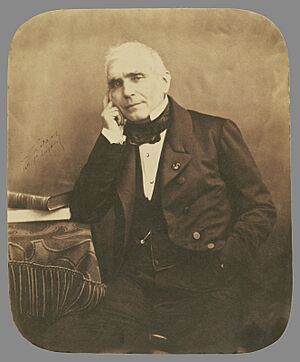Les vêpres siciliennes facts for kids
Quick facts for kids Les vêpres siciliennes |
|
|---|---|
| by Giuseppe Verdi | |
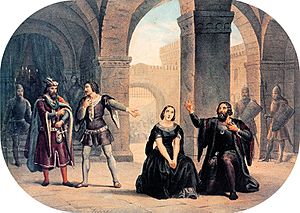
A scene from the Italian version of the opera
(Lithograph by Roberto Focosi) |
|
| Librettist |
|
| Language | French |
| Based on | Original 1838 libretto for Donizetti's Le duc d'Albe |
| Premiere | 13 June 1855;: Paris Opéra |
Les vêpres siciliennes (which means The Sicilian Vespers) is a grand opera by the Italian composer Giuseppe Verdi. A grand opera is a very long and detailed opera, usually with five acts, a large cast, and often includes ballet. This opera is sung in French. The story was written by Eugène Scribe and Charles Duveyrier.
Les vêpres siciliennes was first performed in Paris on June 13, 1855. It came right after three of Verdi's most famous operas: Rigoletto, Il trovatore, and La traviata. The story is based on a real historical event called the Sicilian Vespers from 1282. Today, the opera is performed in both its original French version and a more common Italian version, called I vespri siciliani.
Contents
How the Opera Was Created
Verdi had already adapted one of his earlier operas for the Paris Opéra in 1847. He really wanted to create a brand new grand opera just for them. Italian composers liked the challenge of writing for the French style. They also wanted to reach new audiences.
Verdi started talking with the Opéra, but their plans were stopped by the revolutions of 1848. He picked up discussions again in February 1852. He signed a contract to write an opera, and Eugène Scribe was chosen to write the story (called a libretto). Verdi wanted a "grandiose, impassioned and original" story with impressive scenes.
Scribe missed his deadline, so Verdi went to Paris to talk directly. Scribe suggested using an older story he had written, which had been offered to other composers before. Verdi had many concerns about this old story. For example, he wanted the setting and character names changed. He also wanted a strong fifth act, like other famous grand operas.
Verdi spent 1854 working with Scribe to make changes while he wrote the music. He often complained about how long the opera had to be for the Paris audience. It was a difficult time for Verdi. He even thought about canceling his contract because Scribe was not making the changes he asked for. However, Verdi kept working and was there for the premiere in June 1855. He had spent almost two years in Paris on this opera.
Performances Over Time
In the 1800s
The first performance in Paris on June 13, 1855, was a big success. Critics liked it a lot. One newspaper, La Presse, said that Verdi's music kept its Italian passion while fitting the French style. The famous composer Hector Berlioz praised the opera's melodies, rich music, and grand feeling.
However, the opera's success in Paris did not last long. It was performed for a while, and Verdi even tried to help revive it in 1863 by changing some parts for specific singers. But after a few shows, it disappeared from the Paris stage.
In the 2000s After many years of not being performed much, the original French version of Les vêpres siciliennes has become more popular in the 21st century. It has been staged in major opera houses around the world. For example, it was performed at the Bastille Opera in Paris in 2003 and by the Netherlands Opera in 2010. Other performances include those in Geneva, Naples, Bilbao, Frankfurt, and Munich.
In 2013, the Royal Opera House in London performed the full version for the first time in its history.
Verdi's Italian Version
An Italian version of the story was quickly made under Verdi's guidance. In Italy at that time, it was not allowed to set a story in Sicily if it showed rebellion against rulers. So, the story's location was changed to Portugal in 1640, when it was controlled by Spain. The opera's title was changed to Giovanna de Guzman.
Verdi was not very happy with the Italian translation of the words. After 1861, when Italy became a united country, the opera's Italian title was changed back to I vespri siciliani. This is the version that is often performed today.
Main Characters
| Role: | Voice type | Premiere Cast, 13 June 1855 (Conductor: Narcisse Girard) |
|---|---|---|
| Guy de Montfort, Governor of Sicily under Charles d'Anjou, King of Naples | baritone | Marc Bonnehée |
| Le Sire de Béthune, a French officer | bass | Théodore-Jean-Joseph Coulon |
| Le Comte de Vaudemont, a French officer | bass | Jacques-Alfred Guignot |
| Henri, a young Sicilian | tenor | Louis Guéymard |
| Jean Procida, a Sicilian doctor | bass | Louis-Henri Obin |
| La Duchesse Hélène, sister of Duke Frederick of Austria | soprano | Sophie Cruvelli |
| Ninette, her maid | contralto | Clarisse-Françoise Sannier |
| Daniéli, her servant | tenor | Jean-Jacques Boulo |
| Thibault, a French soldier | tenor | M. Aimes |
| Robert, a French soldier | baritone | Mécène Marié de l'Isle |
| Mainfroid, a Sicilian, adherent of Procida | tenor | Joseph Koenig |
Story of the Opera
- Place: Palermo, Italy
- Time: 1282
Before the opera begins, Procida, a Sicilian patriot, was hurt by French soldiers. He was forced to leave Sicily. Montfort became the French governor of Sicily. A Sicilian woman raised her son, Henri, to hate Montfort, but she never told Henri that Montfort was his father.
Act 1: Palermo's Main Square
French soldiers are celebrating in front of the Governor's palace. The local Sicilians are unhappy about the French occupation. Hélène, who is held by the French, enters. She is sad because her brother was killed by the French exactly one year ago. Her song encourages the Sicilians to fight back. When Governor Montfort arrives, the crowd quiets down. Henri, just out of prison, tells Hélène he hates the governor. Montfort hears this and tells Hélène to leave. Alone with Henri, Montfort offers him a powerful job if he stays away from Hélène. Henri refuses and follows Hélène.
Act 2: By the Sea
Procida returns from exile by boat. He is happy to be back in his homeland. He meets with his friends and orders them to bring Hélène and Henri to him. The three plan an uprising during upcoming wedding celebrations. After Procida leaves, Hélène asks Henri what he wants as a reward. Henri promises to avenge her brother's death and asks only for her love.
Montfort's officer, Béthune, arrives and invites Henri to a ball. Henri refuses and is arrested. French soldiers arrive and take many young women from the square, despite protests from the Sicilian men. Procida and others decide to go to the ball to get their revenge.
Act 3: Montfort's Palace
Scene 1: Inside the Palace
Montfort reads a letter from a woman he once captured. It says that Henri is his son. Montfort is happy that his son is near. Henri is brought in by force. Montfort tells Henri that he is his father. Henri is shocked but still angry. He insults his father and rushes out.
Scene 2: A Ball at the Palace
Montfort signals for a ballet to begin at the ball. Hélène, Henri, and Procida are in the crowd, disguised. Henri is surprised when Hélène and Procida reveal themselves. They say they are there to save him. However, Henri is upset to hear they plan to kill Montfort. When Montfort approaches Henri, Henri tries to warn him. As assassins get close, Henri jumps in front of his father to protect him. The Sicilians are shocked that Henri saved Montfort. Hélène, Procida, and the Sicilians are taken away, cursing Henri. Montfort stops Henri from following them.
Act 4: A Prison
Henri arrives at the prison. He is sad about his friends being in prison. Hélène is brought out and confronts him. Finally, Henri admits that Montfort is his father. Hélène starts to understand his feelings. Procida approaches Hélène and shows her a letter about their coming freedom. But Montfort arrives and orders the prisoners to be executed. Procida is amazed to learn Henri's secret. Henri begs Montfort to spare his friends. Montfort tells Henri to say "My father!" Henri says nothing. As Hélène is led to be executed, Montfort stops it. He announces that the Sicilians are pardoned. He also agrees to Hélène and Henri's marriage and tells the crowd, "I find a son again!" Everyone rejoices.
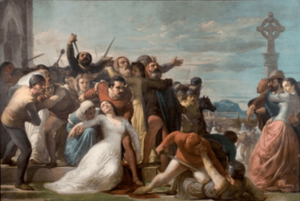
Act 5: The Palace Gardens
Knights and maidens gather. Hélène thanks her friends. Henri arrives, expressing his joy. He leaves to find his father. Procida arrives and tells Hélène about a plan to attack the French. The attack will happen at the altar after the wedding vows. Hélène is torn between her love for Henri and her duty to her people. She tells Henri they cannot marry. Both Henri and Procida are angry with her. Then Montfort arrives, joins Henri and Hélène's hands, and declares them married. As the wedding bells ring, the Sicilians rush in and attack Montfort and the French.
The Music of the Opera
Les vêpres siciliennes is known for its grand scale and dramatic effects. Verdi used this opera to create a new, more complex style of melody. He also worked on showing both the private feelings of the characters and the public events happening around them.
Some music experts say that the songs in Les Vêpres might not be as catchy as those in Verdi's earlier Italian operas. However, they agree that this opera shows a clear change in Verdi's style. It marks the beginning of many musical features that we see in his later, very famous works.
Recordings
| Year | Cast (Hélène, Henri, Montfort, Procida) |
Conductor, Opera House and Orchestra |
Label |
|---|---|---|---|
| 1951 | Maud Cunitz Helge Rosvaenge Heinrich Schlusnus Otto von Rohr |
Kurt Schröder, Chorus and Orchestra of Orchestra of Hessischer Rundfunk, Chorus Director: Edmund von Michnay (Radio recording of February 12, 1951) |
Deutsche Grammophon Cat: LPEM 19244/46 |
| 1969 | Jacqueline Brumaire Jean Bonhomme Neilson Taylor Stafford Dean |
Mario Rossi (Ashley Lawrence for ballet), BBC Concert Orchestra, BBC Chorus |
Audio CD: Opera Rara Cat: ORCV303 |
| 2003 | Nelly Miricioiu, Marcello Giordani, Anthony Michaels-Moore, Ferruccio Furlanetto |
James Conlon, Orchestra and Chorus of the Paris Opera, (Recording...appears to be of the performance on 27 June at the Bastille Opera) |
Audio CD: Celestial Audio, Cat: CA 452 |
| 2010 | Barbara Haveman Burkhard Fritz Alejandro Marco-Buhrmester Balint Szabo |
Paolo Carignani, Netherlands Philharmonic Orchestra and Chorus of the Netherlands Opera (Performed on 23 and 29 September; stage direction by Christof Loy) |
Blu-ray, DVD: Opus Arte Cat: 1060D |
| 2013 | Lianna Haroutounian Bryan Hymel Michael Volle Erwin Schrott |
Antonio Pappano, Orchestra and Chorus of the Royal Opera (Performed in October; stage direction by Stefan Herheim) |
Blu-ray, DVD: Opus Arte |
See also
 In Spanish: Las vísperas sicilianas para niños
In Spanish: Las vísperas sicilianas para niños
 | Misty Copeland |
 | Raven Wilkinson |
 | Debra Austin |
 | Aesha Ash |



